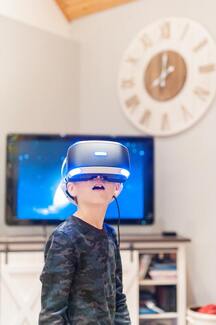 My dog Rio reluctantly posing with a phone for an Instagram photo. My dog Rio reluctantly posing with a phone for an Instagram photo. This week in our ECI 832 class we looked at moral and ethical issues around technology and social media use. Being the nostalgic person I am, I can't help but wonder if all this tech is making our lives better or worse? For example, Google maps seems great to find a random location in a new city compared to the old paper maps and asking locals for directions, but we are losing some social interaction, our brains are less able to follow routes and our phones now track all our movements. With every convenience we seem to have a major trade off in off-loading thinking, giving up personal information, losing our brains abilities or wasting time. So the question I would like to discuss in this post is, is tech great or just a fancy way of providing our data to wealthy tech companies while we become less capable than our grandparents and ancestors?  Photo by Jessica Lewis Creative: https://www.pexels.com/photo/little-kid-wearing-virtual-reality-headset-3405458/ Photo by Jessica Lewis Creative: https://www.pexels.com/photo/little-kid-wearing-virtual-reality-headset-3405458/ This is not a new problem in society, with every advance in technology there comes new problems. With agriculture we had a surplus of food, but also had to protect the food, live in larger groups and work harder and longer to supply our survival needs. With the invent of the combustion engine and fossil fuels, we can zoom around the world and transport goods anywhere, but we die in crashes, pay large portions of our income for vehicles and have to deal with climate change from all the exhaust. Every human advance seems to be a double edged sword whereby there is great benefits but also real costs and downsides. Furthermore, opting out of agriculture, vehicles or technology is possible (theoretically but not really practical) but still one isultimately surrounded and affected by these changes regardless of their participation. I will explore different aspects of technology, namely the computer, the internet, the smart phone and then tech in schools. In looking at computers, they have revolutionized how humans do work and communicate. Before they were all connected we mostly used spreadsheets and local programs to perform tasks, much like a fancy calculator. This is the era I grew up in. The benefits were many in terms of organizing data, producing written work, and calculating detailed accounting, but the scope was limited as each console was an island unto itself. Encyclopedia's on CD made looking up (and plagarizing) information easier than ever! I would suggest, the downside of tech at this point was the reliance of people on the technology especially if it malfunctioned. This was not a huge problem as no connection to the internet meant no viruses unless you installed them with a disk yourself (this often happened but was not widespread). So ultimately computers were handy and there usefulness was limited but so to were there downsides. With the arrival of the internet, we see a significant increase in the scope of what was possible with computers, from email, to chat, to social media, online shopping, streaming shows, and learning management systems. The usefulness of the internet is significant as we all know, but so to are the costs, as we spend huge amounts of our time answering emails, and providing our data to huge tech companies such as Google, Amazon or Facebook. One can limit their technological reliance and sharing, but it is becoming harder, as being online is ever more integrated into the social fabric of our society. From banking, connecting with friends, or doing taxes many institutions and people have fully embraced the use of the internet and technology. This is what people want, I did my taxes in 15 minutes this year online with auto-fill and received my refund within a week of submitting with an etransfer. This is amazing, unless someone steals my identity and takes my money one of these years. With every convenience online we increase risk, being able to communicate with anyone, anywhere is awesome to stay connected with family, but scary in terms of youth being lured into unwanted situations by predators online. Like the vehicle, so much convenience, and so much risk. Smartphones are really just an extension of the internet, but because of their portability and popularity they deserve separate consideration. You now have all the benefits of the internet, communication, cameras, the web, maps / gps, games, music and apps that can entertain and inform you anywhere you are connected to a cell signal. This is amazing, but also disconcerting as when does one disconnect and just be without technology affecting their existence. We have become cyborgs in a sense, with tech a small physical part of our being but a huge mental, social and emotional part of our existence. Furthermore, the risks of the internet are now carried with us where ever we go, tracking, communication, picture tracing and more. And so as awesome as smartphones are, using them sparingly and responsibly is vital. Teaching these lessons to youth is even more important as their identities are very tightly interwoven with their devices and digital identities, without truly understanding the reliance or effects on their personhood, as well as the risks. The last topic, I wanted to explore (as we are all educators in this course) is tech in the classroom. Has it made the classroom way better or just flashier and more work for teachers? I have taught for 15 years, and graduated high school in 1997 so have seen film strip projectors, overheads and eventually computers and projectors take over in the classroom. We now have wifi everywhere and almost every student has a device ready to use just for school work (ha - this is not true as most have a device but often it is used for Snapchat, games and TikTok 95% of the time in high school...). And so I really wonder as a teacher is my life easier, and is education better (or just different) than before tech was the norm. Being a math teacher, graphing, online lessons, and grading programs are useful but I could have kept grades on paper or a spreadsheet and not received DM's from students and parents for every mark or missing assignment. Attendance is the same and now I receive so much connection and communication I would say it is overwhelming. Many of my lessons are greatly enhanced and accessible with technology but because of this I feel many of the students don't embrace or attempt to understand the knowledge. You can just watch a YouTube video anytime or Google what you don't know. I look forward to AR and VR continuing to change and improve learning but am skeptical as it will likely be focused on entertainment and gaming. Tech in the classroom was supposed to make education so great, I just don't know if that is the case, or if we are getting closer or further away from that at this point. The irony is I have taken my whole master's degree online, and have learned a great deal, but in elementary and high school the experience feels different. So my question to readers is, has technology made your life better? If so how? And even more importantly has technology made education better, worse or just different? Thanks for reading and any comments!
Leah Bissonnette
3/26/2022 10:32:51 am
Hi Dylan. Great post. I share many of your concerns and questions when it comes to technology. A big part of me thinks that technology has just made things different, and not necessarily better. When I really think about it though, I believe it has made things better, if perhaps only for the fact that we can connect and interact with people all across the world. I would know nothing of the war in Ukraine right now if it weren't for technology, nor would most of my students. Just this alone has made my students more aware, empathetic, and motivated to make a difference not just in their own lives, but across the globe. 3/27/2022 10:42:06 am
I agree with your concerns about technology and human advancement often having a negative side effect, Dylan. I think, just like anything, technology is great when used the proper amount and for the right reasons. Similar to sugar or salt in food, we need to consider using it in moderation to enhance something that is already good, rather than completely replacing foods (or elements of life) that have substance with junk. Technology has both benefitted and harmed our lives, so I think we need to try and maximize its use for good and positive effects. I know that your blog post was way more comprehnesive than the mapping skills you shared at the beginning, but that's what I got stuck on. Even though there are so many tools out there that are helping us with efficiency skills, we are losing those critical thinking and reflecting skills that are so fundamental. I showed kiddos a map the other day at school, and most had no idea what it was or even how to look at it. Many thought it was artwork, which I guess it is, but it was crazy to me that this is a lost skill. I remember when I first got my driver's license that my dad always told me to have a map handy, because if I could read a map I would be able to get home if I was lost in the city (out of town kid). It was something that I was always so dependant on. It makes me worry a bit that we are losing our abilities to critical examine the world around us. I feel as if we are becoming more accepting of what is in front of us, rather than deciphering if what is in front of us is important or not. Comments are closed.
|
AuthorDylan Johns Categories
All
Archives
April 2022
|

 RSS Feed
RSS Feed
